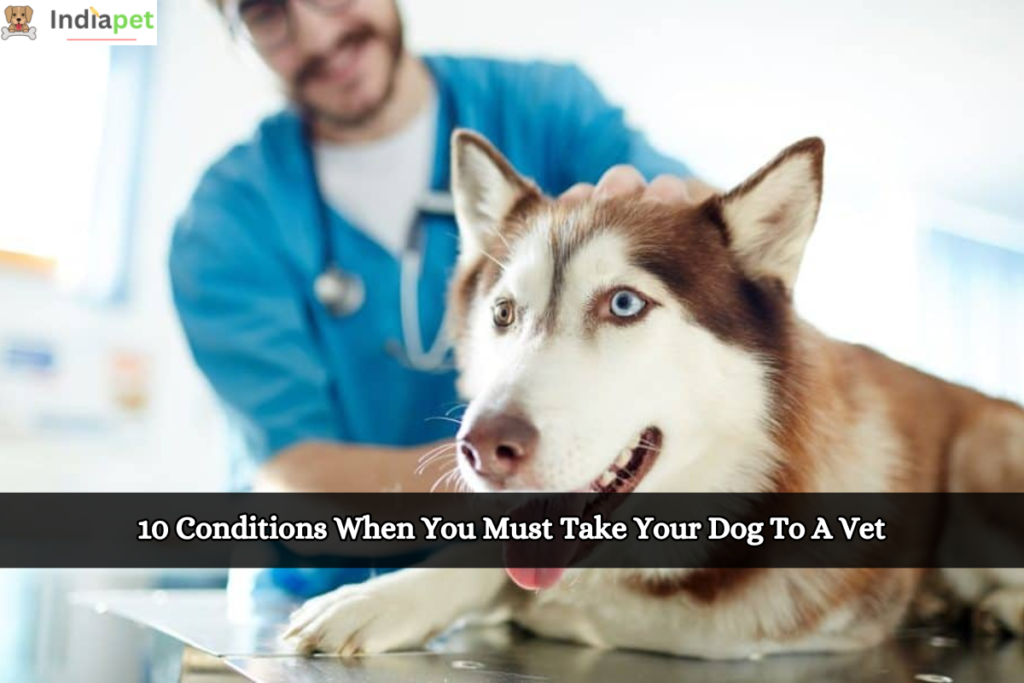10 Conditions When You Must Take Your Dog To A Vet: Do you have a furry friend at home who brings immense joy to your life? As a responsible and loving pet owner, it’s essential to be aware of signs that indicate when your dog needs professional medical attention. Dogs, like humans, experience various health issues, some of which can be serious if left untreated.
10 Conditions When You Must Take Your Dog To A Vet
In this article, we’ll delve 10 Conditions When You Must Take Your Dog To A Vet into ten crucial conditions that require immediate veterinary care. By understanding these signs, you can ensure your four-legged companion receives the prompt care they need to lead a healthy and happy life.
1. Difficulty Breathing
- Rapid breathing, wheezing, or gasping for air can indicate a serious respiratory problem in your dog.
- Keep an eye out for bluish gums, coughing, or choking sounds.
- Seek immediate veterinary assistance to rule out allergies, infections, or even life-threatening conditions such as pneumonia or heart disease.
2. Profuse Bleeding
- If your dog experiences severe bleeding from an injury, wound, or post-surgery, it needs immediate attention.
- Apply pressure to the bleeding area using a clean cloth while rushing to the vet.
- Uncontrolled bleeding can lead to severe blood loss, shock, or complications, necessitating professional intervention.
3. Sudden Paralysis or Inability to Walk
- If your dog experiences sudden paralysis, dragging of limbs, or difficulty in walking, it calls for immediate veterinary attention.
- These symptoms could indicate spinal injuries, nerve damage, or underlying medical conditions such as disc disease or tick paralysis.
- The vet will conduct a thorough examination to determine the cause and provide appropriate treatment options.
Also See:
10 common dog myths That People Still Believe Are True
4. Uncontrolled Vomiting or Diarrhea
- Occasional vomiting and diarrhea can be normal, but persistent episodes require attention.
- Frequent or continuous bouts of vomiting or diarrhea can lead to dehydration and electrolyte imbalance, putting your dog’s health at risk.
- The vet will evaluate your dog’s condition, conduct necessary tests, and administer the right treatment to address the underlying cause.
5. Swollen Abdomen or Distended Stomach
- A swollen abdomen or a distended stomach may indicate a serious medical condition called gastric dilation and volvulus (GDV), commonly known as bloat.
- Bloat is a life-threatening emergency that can cause organ damage and lead to cardiovascular collapse if not treated promptly.
- Rush your dog to the vet immediately if you observe any signs of bloating, such as restlessness, unsuccessful attempts to vomit, or a distended belly.
6. Uncontrolled Seizures
- Seizures can be distressing for your dog and require immediate veterinary care.
- If your dog experiences prolonged seizures, multiple seizures within a short period, or seizures accompanied by loss of consciousness, it demands urgent attention.
- The vet will diagnose the cause, provide appropriate medications, and guide you on managing and preventing future episodes.
7. Unresponsiveness or Loss of Consciousness
- If your dog suddenly becomes unresponsive, collapses, or loses consciousness, it’s crucial to act swiftly.
- This could be due to various reasons, including poisoning, brain disease, cardiac issues, or trauma.
- Immediate veterinary intervention is necessary to identify the root cause and provide life-saving measures.
8. Ingestion of Toxic Substances
- Dogs are naturally curious and may sometimes ingest harmful substances.
- If your dog consumes toxic foods, plants, chemicals, medications, or any other toxic substance, contact your vet without delay.
- The vet will guide you on providing immediate first aid and may induce vomiting or administer specific treatments to prevent severe complications.
9. Difficulty Urinating or Lack of Urination
- Struggling to urinate or a complete inability to urinate could indicate a urinary blockage, which can be life-threatening if not addressed promptly.
- Watch for signs such as frequent trips to the litter box, straining, crying in pain, or blood in the urine.
- Reach out to your vet immediately for diagnosis and appropriate management to prevent kidney damage or rupture of the bladder.
10. Incessant Pain or Distress
- If your dog exhibits signs of severe pain, agitation, or distress, it’s a clear signal that something is wrong.
- Dogs may hide their pain, so pay attention to changes in behavior, reluctance to move, whining, or excessive panting.
- Promptly consult your vet to identify the source of discomfort and alleviate your furry friend’s suffering.
- A healthy dog is a happy dog. By recognizing the signs that require immediate veterinary attention, you play an active role in safeguarding your beloved companion’s well-being.
In the end
Taking care of your dog’s health is crucial to ensure they live a long and happy life. However, it can be challenging to determine when a health problem requires professional intervention. By being vigilant and keeping an eye out for these ten critical signs.
You can provide your furry friend with the prompt medical care they need. Remember, your veterinarian is the best person to guide you through any concerns about your dog’s health. Stay alert, stay informed, and cherish the precious moments with your loyal canine companion.
If you like this Article about 10 Conditions When You Must Take Your Dog To A Vet please share this Article with your friends and family members.


